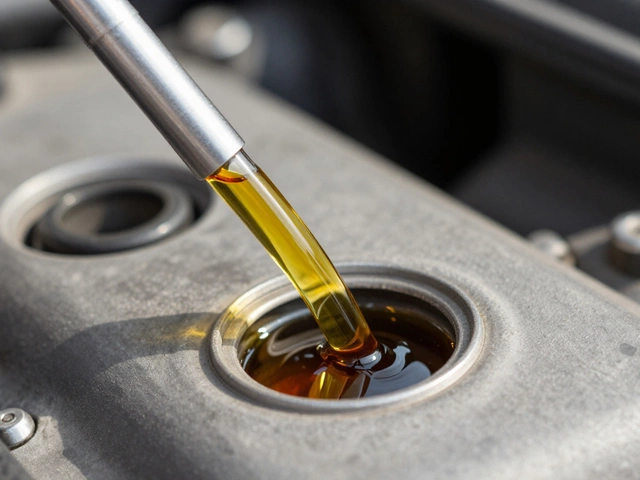Ever wondered how long that trusty car battery of yours is going to last? The truth is, there's no one-size-fits-all answer, but a little bit of knowledge can go a long way in keeping your ride powered up. Car batteries typically last between three to five years. However, factors like climate, driving habits, and maintenance can push that lifespan up or down.
Think about it: if you're constantly stuck in traffic or taking short trips, your battery might age faster than someone cruising the open highway. And yeah, those freezing winters or scorching summers? They play a part too by putting extra stress on your battery.
Let's not wait until you're stranded in a parking lot with a dead battery. Knowing the signs your battery is on its last legs can save you from headaches later. Stuff like slower engine cranks or dimmer interior lights can be red flags. And with a few tips up your sleeve, like regular cleaning and testing, you'll be able to squeeze more juice out of that battery.
- Understanding Car Battery Lifespan
- Factors Affecting Battery Life
- Signs Your Battery Needs Replacement
- How to Extend Your Battery's Life
- Battery Maintenance Tips
- Choosing the Right Battery for Your Car
Understanding Car Battery Lifespan
Dive into your car's heart—literally and figuratively—and you'll find the car battery playing a starring role. On average, most car batteries are designed to last around three to five years. That's not just a random number; it's down to how these things are engineered.
Each time you turn the key or push the ignition button, the battery kicks into action, cranking up the engine. But did you know that each start drains a bit of the battery’s life? And that’s why short commutes where your battery has to keep revving up can be more taxing than long highway routes.
Lifespan Influences
A few factors influence how long your car battery lifespan will be. Climate is a major player. Extreme heat can evaporate the battery fluid, while intense cold can slow down the chemical reactions inside. If you're living in areas with these conditions, like Arizona's sizzling summers or Minnesota's icy winters, your battery might not last as long as someone chilling in a milder climate.
Quality Over Cost
Choosing the right battery can make a difference too. A high-quality battery might cost a little more upfront, but it often pays off with a longer, more reliable life. It's a bit like buying a good pair of shoes—they might pinch your wallet at first, but they often outlast the cheaper options.
So, if you’re wondering how long you can rely on your automotive battery, keep in mind its lifespan is a balancing act between how you drive, where you live, and the battery itself.
Lastly, just to throw a fun fact your way—a study published in 'Car Maintenance Weekly' showed around 50% of dead batteries could have lasted longer with regular check-ups and maintenance. That's something to think about next time you pop the hood.
Factors Affecting Battery Life
Your car battery lifespan isn't just a roll of the dice. It depends on a bunch of factors, some you might not even think about. Let's break it down.
1. Climate Conditions
Hot or cold, extreme weather doesn't do your battery any favors. Heat can speed up chemical reactions inside the battery, which might seem good, but it actually shortens its life. Cold weather makes your battery work harder because chemical reactions slow down. Imagine trying to run a marathon in the middle of winter! According to the AAA, "Heat kills batteries, and a hotter climate might make your battery last only two-thirds as long."
2. Driving Habits
If you're doing a lot of short trips in your car, the battery doesn't get enough time to fully recharge. It's like doing laps in a pool but stopping every few meters. Your battery needs long drives occasionally to keep it in tip-top shape.
3. Maintenance and Care
Regular inspections are a biggie. Cleaning corrosion from the terminals and ensuring it's securely fastened can go a long way. Even a little bit of care can save you from a big headache later.
4. Electrical Add-ons
Do you have a fancy sound system or extra lights? The more electronics you add, the harder your battery works, reducing its lifespan.
5. Age
Like us, batteries don't last forever. A car battery that's older is naturally nearing the end of its life, no matter how well you treat it. If you've had yours for over three years, it might be worth keeping an eye on its performance.
Keep an eye on these factors, and you'll have a good idea of how to maximize the life of your car battery. And remember, none of this guarantees you'll dodge any issues entirely, but it sure does help.
Signs Your Battery Needs Replacement
So, how do you know when it's time to swap out your car battery? It's not like batteries come with a warning light—unfortunately! But there are some telltale signs to look out for that can save you from unexpected trouble.
Slow Engine Crank
One of the most common signs is when the engine cranks more slowly than usual. If your car seems to be struggling to start or takes a while to fire up, it might be a signal that your battery is on its last legs.
Dim Lights and Electrical Issues
Are your headlights not as bright as they used to be? Dimming lights, along with issues with your car's electrical components, can often point to a weakening battery. These systems rely on the battery to function properly, so any hiccups here are worth noting.
Check Engine/Battery Light
While not all vehicles have a specific battery warning, a 'Check Engine' light can indicate a battery-related issue. Don't ignore it. Instead, get it checked out, especially if it's coupled with other signs mentioned here.
Unpleasant Smells
Detecting a nasty, rotten egg smell coming from under your hood? That might be escaping sulfur gas from a damaged battery. If it's happening, that battery might be close to giving up.
Corroded Connectors
Pop the hood and check for white, ashy material on your battery terminals. This corrosion can be a sign of a battery in decline and will definitely need addressing, either by cleaning or replacing the battery.
Old Age
Finally, consider the age of your automotive battery. If it's creeping past the three-year mark, especially in harsh climates, it's a good idea to have it tested regularly. Many auto shops will do this for free!
It's better to be proactive than reactive. By watching for these signs, you can avoid getting stuck with a dead battery at the worst possible moment. Regular checks and maintenance are key to keeping your car humming along smoothly.

How to Extend Your Battery's Life
Want to keep that car battery lifespan going strong for the long haul? With a bit of care and attention, you can do just that. Let's dive into the nitty-gritty of battery maintenance that pays off.
Keep It Clean
First, you gotta keep those battery connections clean. Corrosion can mess things up, leading to poorer performance. Every now and then, check for any buildup around the terminals. If you see a bunch of white, ashy deposit, it’s time for a scrub. A simple mix of baking soda and water can do wonders. Disconnect the cables, scrub gently, reconnect, and you’re golden.
Drive Regularly
Batteries hate sitting idle. If you're not hitting the road often, your battery's charge might dwindle faster than you'd think. Make sure to take your car for a spin every so often. Even a 30-minute drive once a week can help maintain that charge.
Avoid Electrical Drain
Try not to leave the lights on or accessories like the radio running when the engine is off. Doing so can drain your battery quicker than you might guess. Trust me, it’s the small things like this that add up.
Temperature Matters
If you live in a place with extreme temperatures, parking in a garage or shaded area can make a difference. Cold weather can be a real battery killer, and scorching heat isn’t much better. Either way, cutting back on exposure helps maintain your battery's life.
Regular Checks
Lastly, it's good sense to test your battery's voltage with a multimeter every few months to see how it's holding up. If you spot anything unusual, it might be time to think about a replacement before it becomes a road trip bummer.
Keep these tips in mind, and you'll get the most out of your automotive batteries, saving time and money in the long run.
Battery Maintenance Tips
Keeping your car battery in tip-top shape doesn't have to be complicated. A little routine care can go a long way in extending its life and ensuring it stays reliable. Here are some straightforward tips to help you out:
1. Regular Inspections
Just like you check your oil levels, give your battery a once-over every month. Look for any signs of corrosion around the terminals. Corrosion looks like a white, ashy substance, and it's a sign that your battery's not in the best condition.
2. Clean the Terminals
If there's buildup, you can clean the terminals with a simple solution of baking soda and water. Use a toothbrush or small brush to scrub it off. Remember to keep the cable connections tight to avoid any loose connections.
3. Mind the Temperature
If you live in an area with extreme weather, consider extra precautions. For those chilly winters, an insulated battery blanket can prevent the cold from sapping the battery's charge. In blazing summer heat, shade or parking in a garage can help keep temperatures down.
4. Avoid Short Trips
Frequent short trips can prevent your automotive battery from fully charging, leading to quicker wear and tear. If possible, try to take your car out for a longer drive every now and then to help maintain a full charge.
5. Watch for Warning Signs
Pay attention to signs like dim headlights, a slow engine crank, or an alert on your dashboard. These might indicate your battery's struggling and may need to be replaced soon.
6. Professional Testing
Get your battery tested by a pro at least once a year, especially before winter. They can give you an accurate read on how much lifespan your battery has left.
| Maintenance Activity | Recommended Frequency |
|---|---|
| Inspect Battery | Monthly |
| Clean Terminals | Every few months |
| Professional Testing | Annually |
By keeping these tips in mind, not only will you extend the life of your car battery, but you'll also save money on replacements and reduce the chance of unexpected breakdowns. Happy driving!
Choosing the Right Battery for Your Car
Picking the right battery for your vehicle isn't just about grabbing any old thing off the shelf. It’s like finding the right pair of shoes; it has to fit perfectly and perform well. So, what matters when selecting a car battery? First, check your owner’s manual. It’ll tell you the exact specifications your car needs, from size to the type of terminals.
Let’s talk size. Car batteries come in various group sizes that refer to their dimensions. Picking the wrong size could mean it doesn't fit in your car's battery tray, or worse, it could damage electrical systems. Double-checking this can save loads of hassle.
Battery Types: Choosing What Works
There are three main types of automotive batteries you'll come across: Lead-Acid Flooded batteries, AGM (Absorbent Glass Mat), and Lithium-Ion. For most folks, a traditional lead-acid battery works fine. If you’re looking for something that handles heavy loads better, like tons of electronics, AGM might be your buddy.
Lithium-Ion batteries are the new kids on the block, mainly used in hybrids or electric vehicles. They're lightweight and last longer but come with a higher price tag.
Cranking Power and Reserve Capacity
When you see terms like CCA (Cold Cranking Amps), it’s talking about how well the battery can start your car in freezing temperatures. More CCA means better performance in cold weather. This is the beef you need if winters get frosty.
Reserve capacity, on the other hand, is about how long the battery can run your car without relying on the engine or alternator. If you find yourself stopping to take long breaks with the engine off, a high reserve capacity is your friend.
Consider the Climate
Believe it or not, your region’s weather can dictate how long your car battery lifespan will be. In hotter climates, a battery with a higher heat tolerance is a better choice to withstand that blazing sun. Cold climates? You already know—go for those batteries with higher CCA.
In the end, spending a bit more time and maybe cash to pick the right battery can keep your car purring smoothly, no surprise breakdowns or fits. It's all about finding the right balance between cost, performance, and longevity.
| Type | Pros | Cons |
|---|---|---|
| Lead-Acid Flooded | Affordable, widely available | Shorter lifespan, requires maintenance |
| AGM | Durable, low maintenance | Higher cost |
| Lithium-Ion | Lightweight, long-lasting | Expensive |






